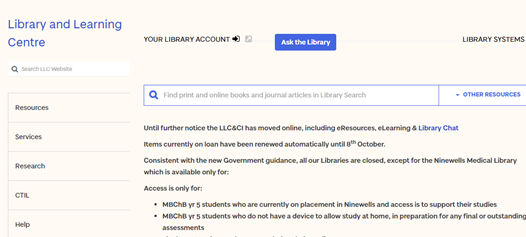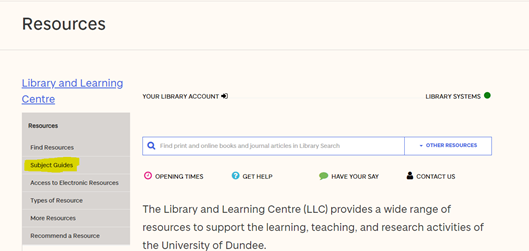Introduction
Conducting effective, high-quality research is vital at postgraduate level. It’s important that you develop confidence and competence in how and where to search for resources, and in your ability to critique the academic credibility of the resources you find.
Searching for Resources
Your first port of call when searching for materials should be the University’s Library and Learning Centre (LLC) website. The search function on the homepage will allow you to quickly access high quality academic sources. Library staff will also be able to help you refine your searches and locate the resources you need.

Another useful feature on the library website is the list of Subject Guides, which can be found under the Resources menu in the left-hand menu bar. In the relevant guides for your subject(s) you’ll find suggestions for useful resources, including academic databases (searchable indexes of resources) commonly used in your subject area. Along with the library search function, these databases will be your main sources for reliable research material.

Library staff will also be able to help you become skilled at defining and refining your searches, and locating the resources you need. It’s important to be able to search accurately and efficiently for sources, so that you don’t become swamped with material or go off on unnecessary tangents.
Types of Resource
Nowadays we have access to an almost endless array of different types of resource, and this can be both a blessing and a curse. Certainly, it’s easier than it ever was to access a wide array of potential sources but it also means there’s a greater danger of overwhelm and of encountering poorer quality material.
Allied to using reliable searches and databases and developing the research skills mentioned earlier, it’s important to be aware of the types of resource that are commonly used in your discipline. These may include:
- JOURNAL ARTICLES – usually peer reviewed and specialist in focus, journal articles are a staple of good research in most disciplines, and particularly at postgraduate level
- BOOKS – also known as MONOGRAPHS, scholarly books focusing on a specific subject are another reliable resource
- TEXTBOOKS – more general in nature than monographs, textbooks provide a good introduction to, or overview of, a field but are often too broad and general in scope to be of much use in a more focused essay or dissertation
- SPECIALIST RESOURCES – resources such as legal sources, business reports and government papers may play a significant role depending on your area of study
- WEBSITES/BLOGS – the internet has revolutionised research but must be used with caution. Websites, blogs and other online resources can be valid sources for an essay, but you must bear in mind the validity and authority of the source
- VIDEO PLATFORMS/PODCASTS – think outside the box. Things like TEDTalks, YouTube videos and specialist podcasts can be excellent sources if used carefully and critically
- AND MANY MORE – this list only scratches the surface, so be open to discovering many other potential types of resources as your academic journey progresses
Critiquing and Selecting Resources
So how do you decide which type of resource you can use when there’s so much to choose from?
Well, as you might expect, it’s not as simple as saying certain types of resource are suitable and other types are unsuitable. Different subject areas will use different resources in different ways, and to different extents, so you need to establish what the practice is in your discipline.
As you begin to read about and research your subject, pay attention to the types of resource these authors draw upon for evidence. This will help you to develop an understanding of the type of sources you should be using in your own research.
More than that though, the key is to develop a critical approach to the individual resources you encounter. Let’s look at some of the key considerations.
Who wrote it?
The first thing to consider is the question of authority. If you’re planning to use a source in your own work, you need to be sure of the author’s credibility in the field.
Look for the author’s affiliation – for example in journal articles you can usually quickly find out which universities the author(s). In books there will typically be an ‘about the author’ section.
This is what makes some websites, such as Wikipedia, so problematic from a research perspective. We simply don’t know who wrote or edited the material, and therefore can’t be sure of the authority of the work.
Is there an agenda?
It follows, then, that related to authority is the question of bias.
Remember, the author of some resources (e.g. websites) might be organisations rather than individuals. In such cases, you have to consider any agenda such organisations may have.
Even academic authors may be coming from a very particular theoretical/ideological position, or in some cases their research may have been funded by organisations with a particular interest. This is not to suggest impropriety on the part of such academics, it’s just another consideration to be aware of.
Is it still relevant?
Another key consideration is the date of publication.
In some cases, you may justifiably use resources dating back many years or decades. But in much research, particularly when you’re engaging with current debates or fast-evolving subjects, sources may quickly become out of date and superseded by more recent research.
Who publishes it?
Another factor to consider is the publisher of the source. Journals are usually published out of universities, and some may be more important or prestigious than others. Look out for a journal’s impact factor – this is a measure of the relevance of that particular journal within its field. The higher the impact factor, the more influential the journal.
Likewise, if your source is a book, is it published by a well-known, established publisher? It’s now easier than ever to self-publish online – again, that’s not to say all such material will be unreliable, but it should be part of your evaluation of that source.
Again, things get more complicated with websites. The websites of well-known organisations can be considered relatively reliable (but remember the point above about bias). Where you cannot identify the organisation or individual behind the website, then once again you need to be sensitive to the question of authority.
How influential is it?
When you conduct research, you want to be sure that you identify any particularly influential or prominent work in the area. Once again, this is not to exclude other work which may be more recent or less established, it’s simply to ensure that your research is thorough and pays heed to the important voices or arguments in the field.
Some databases may indicate how many times an article has been cited in other publications. More broadly, you can look out for the same studies or names cropping up in your reading. This is a simple but effective indicator of which works are particularly influential in that field.
If you’d like to explore more about identifying credible and reliable sources, this video explores this idea in more detail, using a fun example in a clear and accessible style.
Practical ways to develop your critical research skills
- Explore and become comfortable with the library search function and resources for your subject. Practice searching for resources, and then refining that search to reduce the number of results (and hopefully increase their relevance)
- Identify the types of resources that are most commonly used in your discipline area(s). You could do this by searching for some resources and looking at the types of source they have in their reference lists.
- Think about how you might use Kipling’s Six Honest Serving Men (What, Why, When, How, Where and Who) to quickly evaluate the credibility of a source.
Summing Up
Good grades begin with good research. Using the appropriate search engines and databases, and learning how to frame your searches, will get you off to the best possible start by ensuring you access the most reliable and relevant resources. Taking care to evaluate and assess the credibility of these resources before you get too far into the reading will further ensure that your research is as focused and efficient as possible.
